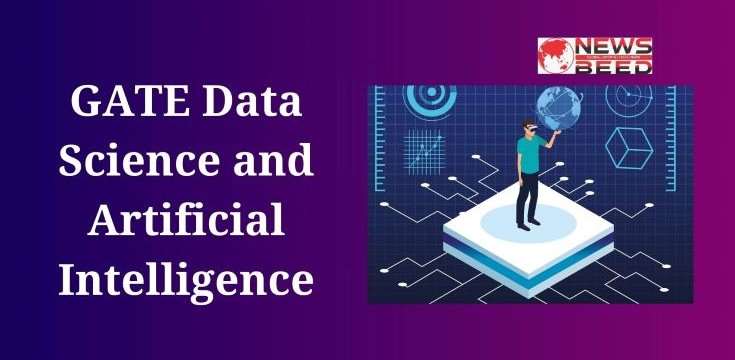GATE (Graduate Aptitude Test in Engineering) Data Science and Artificial Intelligence (AI) is a critical examination segment for those aiming to pursue postgraduate education in engineering, technology, architecture, science, commerce, and arts in India. It serves as a gateway for admissions and financial assistance to master’s and doctoral programs. The inclusion of Data Science and AI as part of the GATE syllabus reflects the growing importance and integration of these fields in engineering and technology education.
Table of Contents
ToggleUnderstanding Data Science and Artificial Intelligence
Data Science is an interdisciplinary field that uses scientific methods, processes, algorithms, and systems to extract knowledge and insights from structured and unstructured data. It combines aspects of mathematics, statistics, computer science, and information technology to analyze, interpret, and visualize data, making informed decisions and predictions.
Artificial Intelligence, on the other hand, is a branch of computer science concerned with building smart machines capable of performing tasks that typically require human intelligence. AI encompasses a variety of techniques and methodologies, including machine learning (ML), natural language processing (NLP), robotics, and computer vision, aimed at creating systems that can learn, reason, perceive, and undertake autonomous decisions.
GATE Exam Pattern and Syllabus for Data Science and AI
The GATE examination for Data Science and AI covers a comprehensive syllabus designed to assess a candidate’s understanding and proficiency in these domains. The exam pattern typically includes multiple-choice questions (MCQs), multiple-select questions (MSQs), and numerical answer type (NAT) questions, covering both core and advanced topics.
Core Topics:
- Statistics and Probability: Fundamental concepts of probability, distributions, sampling, hypothesis testing, and statistical measures.
- Linear Algebra and Calculus: Matrix algebra, Eigenvalues, Eigenvectors, differential equations, gradients, and optimization techniques.
- Computer Science Fundamentals: Algorithms, data structures, databases, and programming concepts.
Advanced Topics:
- Machine Learning: Supervised, unsupervised, and reinforcement learning models, including linear regression, logistic regression, decision trees, neural networks, clustering algorithms, and dimensionality reduction techniques.
- Deep Learning: Architectures like convolutional neural networks (CNNs), recurrent neural networks (RNNs), autoencoders, and techniques for training deep networks.
- Natural Language Processing: Techniques and models for text processing, sentiment analysis, language modeling, and machine translation.
- Data Visualization and Analysis: Tools and techniques for visualizing and analyzing large datasets to extract meaningful information.
- Big Data Technologies: Understanding of big data frameworks, distributed computing, and storage systems.
Significance of Data Science and AI in GATE
Integrating Data Science and AI into the GATE syllabus signifies the recognition of the transformative impact these fields have on technology and society. As industries and academia increasingly adopt data-driven decision-making and AI-powered solutions, there is a growing demand for professionals skilled in these areas. The GATE examination provides a platform for aspiring engineers and technologists to demonstrate their competence and readiness to contribute to these dynamic fields.
Preparing for Data Science and AI in GATE
Preparing for the Data Science and AI segment of the GATE examination requires a strategic approach, encompassing both theoretical knowledge and practical skills. Candidates should focus on:
- Understanding Fundamental Concepts: A strong grasp of core topics in mathematics, statistics, and computer science is crucial.
- Practical Application: Hands-on experience with data analysis, machine learning models, and programming languages such as Python or R.
- Problem-Solving Skills: Ability to apply concepts to solve real-world problems, analyze datasets, and develop AI models.
- Resources and Study Materials: Utilize textbooks, online courses, research papers, and tutorials to deepen understanding and stay updated with latest developments.
- Mock Tests and Previous Year Questions: Practice with mock exams and previous years’ questions to familiarize with the exam pattern and time management.
The Future of Data Science and AI in Education
The inclusion of Data Science and AI in the GATE exam underscores the importance of these fields in the future of engineering and technology education. As the demand for skilled professionals in these areas continues to grow. Educational institutions are increasingly integrating these subjects into their curriculum. This trend is not only preparing students for the challenges of the modern world but also driving innovation and development across various sectors.
You May Also Read:
What is Digital Marketing in Hindi
SEO Interview Questions and Answers
What is Affiliate Marketing Meaning
Conclusion
The GATE examination’s focus on Data Science and Artificial Intelligence reflects the evolving landscape of engineering and technology education. By assessing candidates’ knowledge and skills in these critical areas. The GATE exam plays a pivotal role in shaping the next generation of engineers and technologists. As these fields continue to advance. Their integration into educational assessments like GATE ensures that students are equipped with the knowledge and skills necessary to thrive in a rapidly changing technological environment.
Final Thoughts
This blog post outline aims to comprehensively cover the preparation strategy for GATE in Data Science and AI. Aspiring candidates should use this as a guideline to structure their study plans and approach. The exam with confidence, armed with the best resources and strategies for success.
FAQs:
Q1. What is GATE Data Science and Artificial Intelligence?
Answer: GATE Data Science and Artificial Intelligence is a subject-specific test under the GATE exam, focusing on assessing the knowledge and understanding of candidates in the areas of data science and artificial intelligence.
Q2. Who conducts the GATE exam?
Answer: The GATE exam is jointly conducted by the Indian Institute of Science (IISc) Bangalore and seven Indian Institutes of Technology (IITs) on behalf of the National Coordination Board (NCB) – GATE, Department of Higher Education, Ministry of Education (MoE), Government of India.
Q3. What is the eligibility to appear for the GATE Data Science and AI exam?
Answer: Candidates with a Bachelor’s degree in Engineering/Technology/Architecture/Science/ Commerce/Arts are eligible. Master’s degree students in any relevant science subject are also eligible.
Q4. How is the GATE Data Science and AI exam structured?
Answer: The exam consists of multiple-choice questions (MCQs), multiple-select questions (MSQs), and numerical answer type (NAT) questions, covering topics in Data Science and AI.
Q5. What is the duration of the GATE Data Science and AI exam?
Answer: The exam duration is 3 hours.
Q6. How can I apply for the GATE Data Science and AI exam?
Answer: Applications can be submitted online through the official GATE Online Application Processing System (GOAPS).
Q7. What is the application fee for the GATE exam?
Answer: The application fee varies based on the category and the timing of the application (regular vs. late period). It typically ranges from INR 750 to INR 2000 for Indian candidates.
Q8. Can I use a GATE score for employment?
Answer: Yes, several public sector undertakings (PSUs) use GATE scores for recruitment purposes. Additionally, it can be used for admissions to various postgraduate programs.
Q9. How is the GATE score calculated?
Answer: The GATE score is calculated using a normalization process based on the relative performance of all candidates appearing in the exam across multiple sessions.
Q10. When are the GATE results announced?
Answer: GATE results are typically announced about a month after the exam date on the official GATE website.





you are truly a just right webmaster The site loading speed is incredible It kind of feels that youre doing any distinctive trick In addition The contents are masterwork you have done a great activity in this matter
Fantastic beat I would like to apprentice while you amend your web site how could i subscribe for a blog site The account helped me a acceptable deal I had been a little bit acquainted of this your broadcast offered bright clear concept
Wow amazing blog layout How long have you been blogging for you made blogging look easy The overall look of your web site is magnificent as well as the content